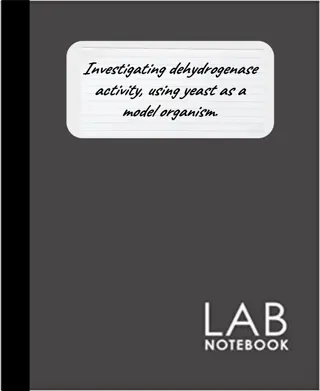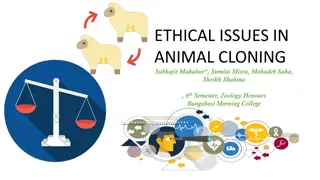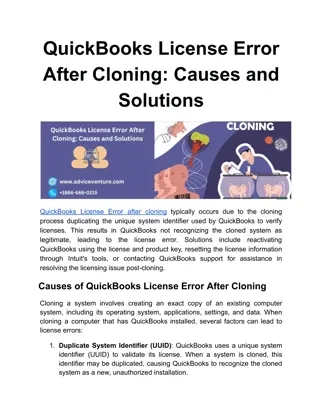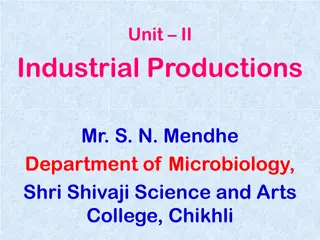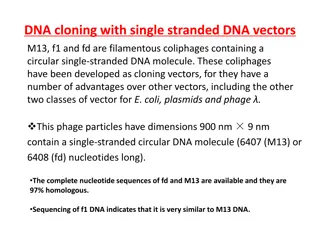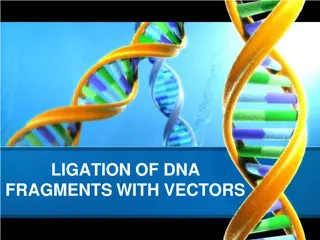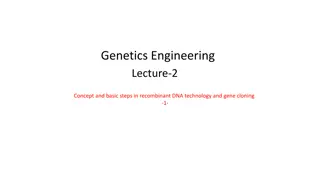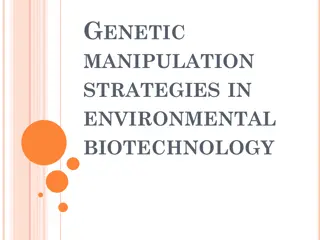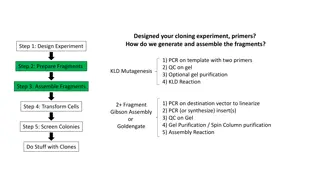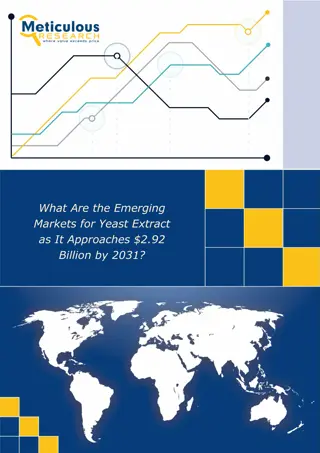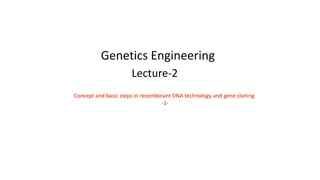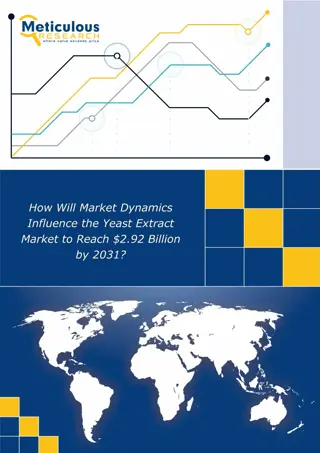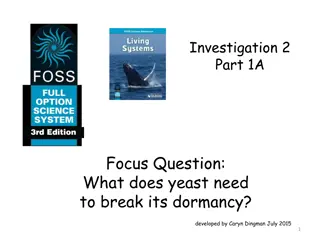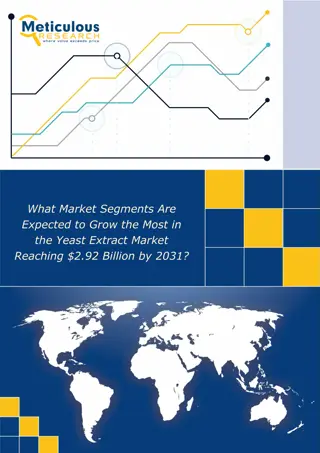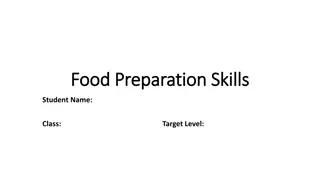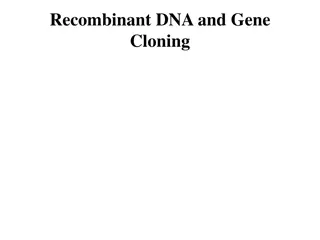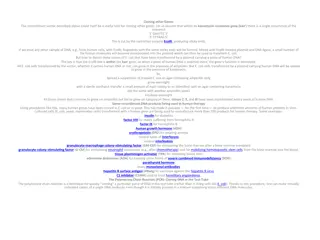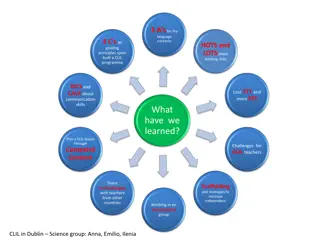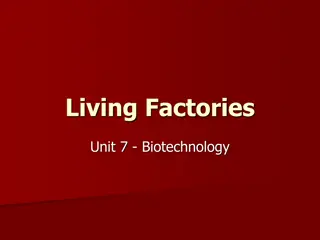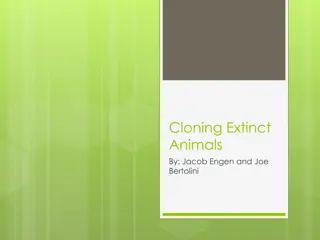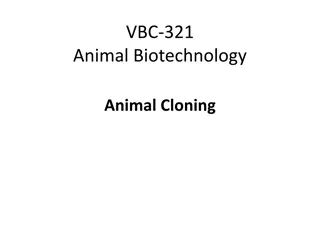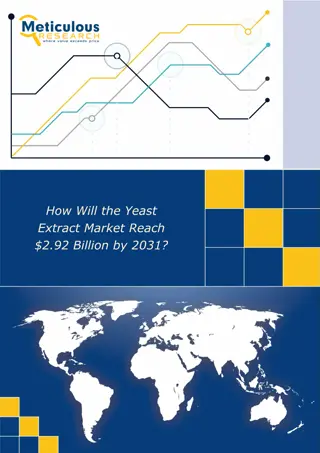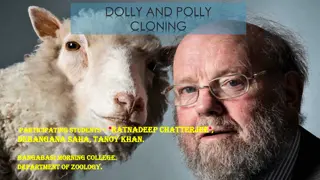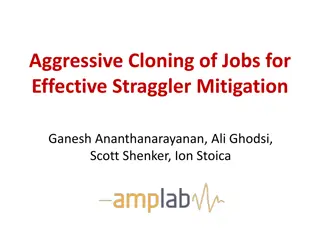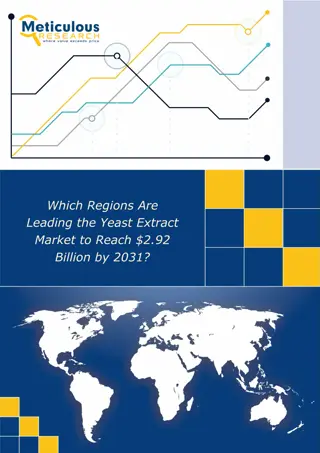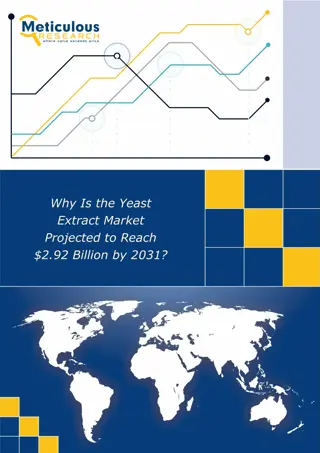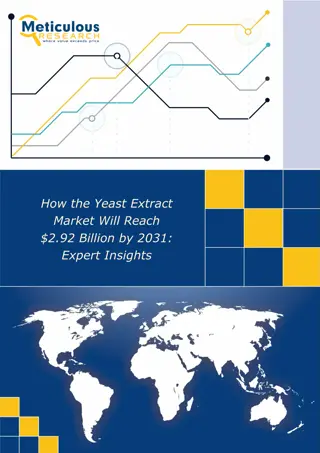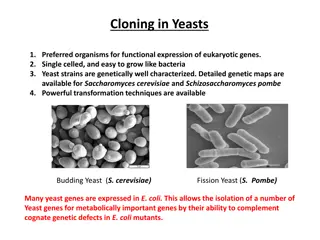Ethanol production
Ethanol, produced through fermentation by yeast in oxygen-free conditions, serves as a chemical feedstock, solvent, disinfectant, and fuel additive. The biochemistry involves sugar breakdown to pyruvic acid, then conversion to acetaldehyde and finally ethanol. Yeast growth in rich medium leads to et
0 views • 21 slides
Introduction to Biotechnology in Pharmaceutical Sciences: A Comprehensive Overview by Swarnakshi Upadhyay
Biotechnology in pharmaceutical sciences encompasses the application of scientific and engineering principles to utilize biological agents for various services. It includes molecular biology for production of pharmaceuticals like antibiotics, proteins, and enzymes, as well as large-scale production
0 views • 9 slides
Investigating Dehydrogenase Activity Using Yeast
This investigation focuses on exploring respiration in yeast by tracking the breakdown of glucose using dehydrogenase enzymes. The experiment involves immobilizing yeast into gel balls and measuring the change in color of resazurin dye to quantify the rate of respiration. Safety measures, risk asses
2 views • 11 slides
Comprehensive Overview of ABE Lab Manual and Foundations of Biotech Package
The ABE Lab Manual, authored by Doreen Osgood, MS, PhD, is a comprehensive resource for biotechnology education, including sequences like Genetic Engineering and Colony PCR. The manual includes teacher and student guides, along with related resources like PowerPoint presentations and lists of labora
1 views • 5 slides
Regulation of Cdc14 Activity in Budding Yeast during Anaphase
The FEAR (Cdc14 early anaphase release) network and the MEN (mitotic exit) network play vital roles in controlling Cdc14 activity in budding yeast during anaphase. These networks regulate Cdc14 through its association with the inhibitor Net1 (Cfi1) and facilitate Cdc14 activation through sequential
4 views • 17 slides
Understanding Fungal Microorganisms and Their Impact on Human Health
Fungal microorganisms, including yeast and mold, play crucial roles in the human body's ecosystem. They can be both beneficial and harmful, influencing conditions like candidiasis and mycoses. Learn about the diverse forms and functions of eukaryotic organisms, their morphology, and the transition b
8 views • 33 slides
QuickBooks License Error After Cloning A Comprehensive Guide
If you have encountered a license error in QuickBooks after cloning your system, you are not alone. This issue can cause disruptions and inconvenience in your workflow. But don't worry, we have a comprehensive guide that provides effective solutions to help you troubleshoot and resolve this problem
6 views • 3 slides
Exploring Ethical Issues in Animal Cloning and its History
Animal cloning involves creating genetically identical replicas of cells or organisms, with advancements being made in therapeutic cloning and gene cloning. The history of animal cloning dates back to the successful cloning of sheep like Dolly in 1996. The cloning procedure involves collecting cells
0 views • 21 slides
QuickBooks License Error After Cloning_ Causes and Solutions
QuickBooks License Error after cloning typically occurs due to the cloning process duplicating the unique system identifier used by QuickBooks to verify licenses. This results in QuickBooks not recognizing the cloned system as legitimate, leading to the license error.
3 views • 5 slides
Yeast Breads Preparation Guide
Explore the world of yeast breads with essential information on yeast, ingredients, terms to know, mixing methods, and baking tips for successful bread making. Learn about the role of yeast as a microscopic plant and the key ingredients needed to create delicious bread. Discover important techniques
0 views • 12 slides
Industrial Production of Ethyl Alcohol: Processes and Microorganisms
Ethyl alcohol production from molasses involves specific steps like selecting yeast strains, preparing inoculum, and creating fermentation conditions. Yeasts like Saccharomyces cerevisiae play a crucial role due to their alcohol tolerance and rapid growth properties. The process requires careful han
1 views • 23 slides
Understanding DNA Cloning with Filamentous Coliphages
Filamentous coliphages M13, f1, and fd are utilized as cloning vectors due to their circular single-stranded DNA molecules and advantages over other vectors. These phages have dimensions of 900 nm x 9 nm and infect bacteria through F pili, releasing up to 1000 phage particles per cell per generation
0 views • 17 slides
Understanding DNA Ligation Techniques for Molecular Biology Applications
DNA ligation involves joining DNA fragments to vectors to create new DNA or plasmids. Methods include DNA ligase, T4 ligase, and terminal deoxynucleotidyl transferase. Linkers and adaptors play a key role in DNA cloning experiments by generating sticky ends for DNA cloning. The use of adaptors allow
1 views • 13 slides
Understanding Recombinant DNA Technology and Cloning Vectors in Genetics Engineering
Exploring the fundamentals of recombinant DNA technology and gene cloning, this content delves into the key concepts and basic steps involved. It covers various cloning vectors such as plasmids, bacteriophages, and artificial chromosomes, highlighting their common features and applications in geneti
0 views • 12 slides
Understanding Genetics: Mutations, Chromosomal Aberrations, and Genetic Engineering
Genetic mutations can be harmless, harmful, or beneficial, leading to variations within a species. Examples of gene mutations and chromosomal aberrations, like Trisomy 21, illustrate genetic abnormalities. The increase in Down Syndrome cases with maternal age highlights a maternal age effect. Geneti
0 views • 17 slides
Mastering the Art of Yeast Breads: Techniques and Tips
Understanding the role of yeast in breadmaking is essential for achieving perfect loaves. Explore the process from kneading to proofing, and learn about key ingredients and mixing methods. Discover expert tips on fermentation, shaping, and baking to create delicious homemade bread every time.
0 views • 12 slides
Genetic Manipulation in Environmental Biotechnology
Genetic manipulation strategies in environmental biotechnology involve techniques like gene splicing and molecular cloning to modify genes directly. These methods have various applications such as isolating genes, producing specific molecules, improving biochemical production, creating organisms wit
0 views • 20 slides
Cloning Experiment Overview and Procedures
The cloning experiment involves designing primers, generating and assembling fragments through PCR, gel purification, and KLD reaction. Further steps include fragment preparation, assembly, cell transformation, colony screening, and working with clones. Detailed instructions for KLD mutagenesis, QC
0 views • 11 slides
Yeast extract market
The growth in the yeast extract market is fueled by several factors, including the rising popularity of bakery products, the expanding vegan and vegetarian population, the increased demand for alcoholic beverages, and the ongoing reduction in salt us
0 views • 3 slides
Understanding Cloning Vectors and Recombinant DNA Technology
Genetics Engineering Lecture-2 delves into the concept and basic steps of recombinant DNA technology and gene cloning, highlighting different types of cloning vectors like plasmids, bacteriophages, bacterial artificial chromosomes, yeast artificial chromosomes, and mammalian artificial chromosomes.
1 views • 13 slides
Yeast extract market
With a projected market value of $2.92 billion by 2031, the yeast extract industry is expected to grow at a CAGR of 6.8% between 2024 and 2031.\n
0 views • 3 slides
Investigating Yeast Activation: What Does Yeast Need to Break Dormancy?
This investigation delves into understanding what yeast requires to become active and break its dormancy. By providing warmth, water, and food sources like cookies, students study the impact of these elements on yeast activation. Through practical experiments involving yeast in different conditions,
7 views • 11 slides
Yeast extract market
The Yeast Extract Market is on track to grow to $2.92 billion by 2031, supported by a CAGR of 6.8% during the 2024-2031 period.\n
0 views • 3 slides
Understanding Bread Making Process: Flour, Yeast, & Water
Strong plain flour, yeast, and water play crucial roles in bread making. The flour provides gluten for structure, yeast produces carbon dioxide for rising, and water activates fermentation. Together, they create an elastic dough that traps gas bubbles, resulting in a quality bread product.
0 views • 10 slides
Understanding Yeast Dough: Types and Techniques
Yeast dough is the foundation of various baked goods, offering a canvas for creativity with different types such as lean, soft, and enriched dough. Learn about the basic ingredients, methods like straight dough mixing, and essential concepts like yeast hydration and bulk fermentation in baking. Disc
0 views • 6 slides
Understanding Recombinant DNA and Gene Cloning
Recombinant DNA is artificially created by combining DNA from multiple sources into a single molecule. This process involves treating DNA with restriction endonucleases, such as BamHI, which cut at specific sites, resulting in sticky ends that can base pair with complementary DNA molecules. DNA liga
0 views • 33 slides
Cloning Other Genes and Recombinant DNA Technology
The recombinant vector with a kanamycin resistance gene can be used to clone other genes by inserting human DNA fragments and selecting transformed E. coli cells. This technique has enabled the production of various human proteins for therapeutic purposes, such as insulin, growth hormones, and clot-
0 views • 6 slides
Exploring Alcoholic Fermentation Using Yeast in CLIL Science Lesson
This CLIL lesson focuses on the process of alcoholic fermentation using yeast in brewing, baking, winemaking, and cider production. Students will learn about metabolism, biotechnology applications, and different cultures in Europe. The lesson includes activities to build understanding through hands-
0 views • 4 slides
Understanding Yeast: The Living Organism and Its Respiration Processes
Explore the world of Saccharomyces cerevisiae (yeast) as a single-celled fungus that exists on all living matter. Learn about its genetic similarities to humans, its basic survival needs, and the processes of aerobic and anaerobic respiration, including fermentation. Discover how yeast, like us, rel
0 views • 26 slides
Proximity Card Security_ Best Practices for Preventing Cloning and Tampering
Discover effective strategies to prevent cloning and tampering of proximity cards, ensuring your security remains intact.
1 views • 5 slides
Decoding Cloning Extinct Animals: Pros, Cons, and Methods
Delve into the fascinating world of cloning extinct animals presented by Jacob Engen and Joe Bertolini. Explore the reasons for and against reviving these creatures, alongside the challenges and methods involved in the cloning process, including the ethical implications and potential environmental i
0 views • 5 slides
Applications of Transgenic Animals in Biotechnology and Cloning
Cloning in animals offers the advantage of indefinite duplication of elite genotypes without the genetic risks of meiosis. Transgenic animals, genetically modified to carry foreign genes, play a crucial role in genetic research and the development of livestock with desired traits. Methods like DNA m
0 views • 13 slides
Yeast extract market
The Yeast Extract Market is poised to reach $2.92 billion by 2031, growing at a CAGR of 6.8% during the forecast period from 2024 to 2031.\n
0 views • 3 slides
The Fascinating World of Cloning: From Dolly the Sheep to Genetic Replication Techniques
Cloning is the process of creating genetically identical organisms, either naturally or artificially. This article delves into the various techniques of cloning such as gene cloning, reproductive cloning, and therapeutic cloning. It also highlights the groundbreaking story of Dolly the sheep, the fi
0 views • 17 slides
Aggressive Cloning of Jobs for Effective Straggler Mitigation
Small jobs are increasingly important in big data processing systems, but are particularly sensitive to stragglers. Various straggler mitigation techniques like blacklisting and speculation have limitations when it comes to small jobs. A proposed solution is the proactive cloning of jobs to probabil
0 views • 20 slides
Fast File Clone in ZFS Design Proposal Overview
This document details a proposal for implementing fast file clone functionality in ZFS, allowing for nearly instant file copying through referencing. The motivation behind this proposal includes support for VMware VAAI, NAS Full File Clone, and Fast File Clone to save memory and disk space. The prop
0 views • 29 slides
Yeast extract market
By growing at a rate of 6.8% annually from 2024, the yeast extract market is anticipated to reach a valuation of $2.92 billion by 2031.\n
0 views • 3 slides
Yeast extract market
The Yeast Extract Market is projected to grow to $2.92 billion by 2031, with an anticipated compound annual growth rate (CAGR) of 6.8% from 2024 through 2031.\n
0 views • 3 slides
Yeast extract market
The yeast extract market is anticipated to achieve a value of $2.92 billion by 2031, growing at a CAGR of 6.8% between 2024 and 2031.\n
0 views • 3 slides
Understanding Cloning in Yeasts: Vectors and Selectable Markers
Yeasts like Saccharomyces cerevisiae and Schizosaccharomyces pombe are valuable organisms for eukaryotic gene expression. They offer easy growth like bacteria and are genetically well-characterized. Yeast selectable markers and vectors enable efficient cloning and expression of genes. The use of shu
0 views • 16 slides


